

Scientists store data inside DNA that could last MILLIONS of years. Potential for DNA to be used for data storage has been discussed for yearsBut retrieving the data encoded in the genes has previously proved trickyInspired by fossils, researchers from Zurich encased DNA in a 'fossil shell'They subjected these shells - or silica spheres - to extreme temperaturesThis was carried out to mimic chemical degradation seen naturally on DNADespite the conditions, the DNA was extracted and decoded from the silicaAnd if preserved in freezing temperatures, the researchers said the data has the potential to last for 'millions of years' inside DNA By Victoria Woollaston for MailOnline Published: 15:35 GMT, 16 February 2015 | Updated: 18:38 GMT, 18 February 2015.
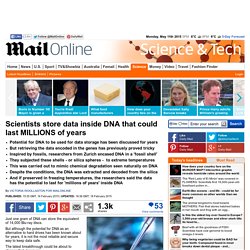
The cars we’ll be driving in the world of 2050. Car companies have recently been telling us what the car of 2020 will be like: autonomous is one word used, electric is another, and it will be connected to the internet too.
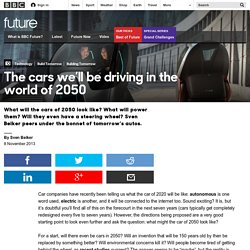
Sound exciting? It is, but it’s doubtful you’ll find all of this on the forecourt in the next seven years (cars typically get completely redesigned every five to seven years). Future Timeline. The cars we’ll be driving in the world of 2050. The World In 2050. From 2009 to 2050, the number of countries involved in internal armed conflicts will decrease by more than 50%, according to a report from International Studies Quarterly.
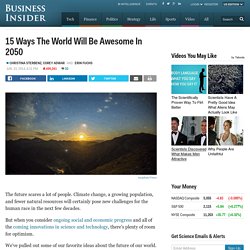
The prediction applies to internal armed conflicts pitting governments against organized opposition groups, which are deadlier and longer-lasting than other conflicts, the report's co-author University of Oslo Political Science Professor Håvard Hegre told Time. The study predicted that, in 2050, 7% of countries will be embroiled in internal armed conflicts, down from 15% in 2009. Hegre's prediction is based on a statistical model that considered factors like education, infant mortality, past conflicts, oil, ethnicities, and youth population. Just Having More Sex Won't Make You Happier.
By Natalie Shoemaker We live in a society that puts sex on a pedestal.

Researchers and self-help books have touted that having more of it will make you a happier person. OK, yes, sex is a lot of fun, but just having more of it doesn't necessarily make you happier. Where Will We Be in 2050? – Scenario I: A World in Ruins. Where Will We Be in 2050?

Scenario I: A World in Ruins By Kevin D. Mind-reading Technology Speeds Ahead. Jack Gallant perches on the edge of a swivel chair in his lab at the University of California, Berkeley, fixated on the screen of a computer that is trying to decode someone's thoughts.
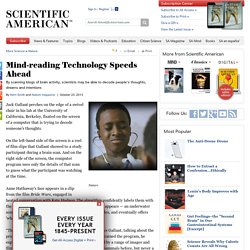
On the left-hand side of the screen is a reel of film clips that Gallant showed to a study participant during a brain scan. And on the right side of the screen, the computer program uses only the details of that scan to guess what the participant was watching at the time. Anne Hathaway's face appears in a clip from the film Bride Wars, engaged in heated conversation with Kate Hudson. The algorithm confidently labels them with the words 'woman' and 'talk', in large type.
Another clip appears — an underwater scene from a wildlife documentary. 5 Technologies That Have Made It Possible to Read People’s Minds. The ability to read other people’s minds still belongs to science fiction, but, in fact, neuroscience has already taken tangible steps toward making it a reality.

Here are some of the recent technological advances that allowed researchers to “crack” the human mind. 1. This is what travel will look like in 2030, 2050 and 2100. Skyscanner's Future of Travel report predicts personalised hotel visitsBiometric scanning could revolutionise the airport check-in processUnderwater hotels will become mainstream and space holidaying possibleAirbus has developed renderings of their panoramic planes of the future By Katie Amey for MailOnline Published: 07:20 GMT, 24 April 2015 | Updated: 20:44 GMT, 24 April 2015 While time travel may be something that we've only seen in sci-fi films, some scientists believe it may be commonplace in as few as 85 years.

From biometric scanning to iPad-controlled hotel rooms, glimpses into the future of travel have already begun popping up in airports and resorts around the world. Alex Garland's film Ex Machina explores the limits of artificial intelligence - but how close are we to machines outsmarting man? - Features - Gadgets and Tech. In the film Ex Machina, released this week, a young coder finds himself in the company of an attractive robotic female entity named Ava, built by his boss.
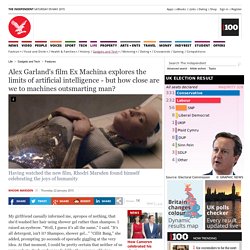
The film's narrative hangs around the apparent self-awareness possessed by Ava; at times, it's evident that she passes the Turing Test, the term given to the various ways in which artificial intelligence (AI) is measured against that of humans. Film review: Ex Machina But is Ava actually experiencing consciousness? Can she feel? Is she capable of making light-hearted quips about bathroom cleaner and enjoying the reaction said quip prompts in others? Những dự đoán thú vị cho tương lai thế giới trước năm 2030. Các vùng biển thế giới tràn ngập robot tuần tra trong tương lai? Những dự đoán thú vị cho tương lai thế giới trước năm 2030. 10 dự án tương lai đặc biệt nhất thế giới - Thị trường - Zing.vn. Bong bóng đầu cơ hay tiền của tương lai. Các vùng biển thế giới tràn ngập robot tuần tra trong tương lai? Điểm danh 7 vũ khí tối tân của tương lai. 10 toà nhà cao nhất thế giới trong tương lai.
Những phát minh đột phá trong tương lai. 10 ý tưởng sẽ cải tiến tương lai. Tiên lượng tương lai, chuyển thông điệp cứu thế giới. Khám phá thế giới: Hướng tới tương lai - Phần 1 - Video đã phát trên. Dự đoán tương lai Trái đất trong 150 năm tới. Stephen Hawking: The afterlife is a fairy tale (but your brain might go on) - CNET.
Carol Bartz knows what it's like to be the only woman on the top management team and board of a technology company.
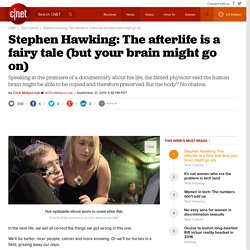
She's seen just about everything the industry can throw at a woman. That's why she "couldn't be more disappointed" by what's going on in Silicon Valley and the technology industry today. The former CEO of Autodesk and Yahoo, who's served on the boards of Intel, Cisco Systems, BEA Systems and Network Appliance (now called NetApp), earned her computer science degree in 1971, when women held few professional jobs in the United States. Thiên tài khuyết tật Stephen Hawking và 12 câu nói để đời. Top 8 công nghệ viễn tưởng sẽ trở thành sự thật trong tương lai.
Baba Vanga The Truth about Her Predictions!, page 1. I just looked through a thread "Obama the last president" Obama the Last President and in that thread Baba Vanga was named as a source of a predictions that says Obama will be the last president of USA. Furthermore, i went through some other threads about Baba Vanga's prophecies in which supposedly she has made predictions all the way to year 5000-something like this one Baba Vanga predictions. Well none of this is true i will have to say. Here i a link of an interview with Baba Vanga's closed neighbors and friends made in July 2010.
Interview about Baba Vanga. It is in Bulgarian so i will translate the important parts that are of concern for the truth to come to light. Nhà tiên tri Vanga dự đoán về thảm họa năm 2014. What Will Life Be Like in 2050? By Big Think Editors By mid-century there will likely be 9 billion people on the planet, consuming ever more resources and leading ever more technologically complex lives. What will our cities be like? How will we eat? Futurology: Imagining the world in 2050. Photosynthesis hack is needed to feed the world by 2050. Using high-performance computing and genetic engineering to boost the photosynthetic efficiency of plants offers the best hope of increasing crop yields enough to feed a planet expected to have 9.5 billion people on it by 2050, researchers report in the journal Cell.
There has never been a better time to try this, said University of Illinois plant biology professor Stephen P. Long, who wrote the report with colleagues from Illinois and the CAS-MPG Partner Institute of Computational Biology in Shanghai. "We now know every step in the processes that drive photosynthesis in C3 crop plants such as soybeans and C4 plants such as maize," Long said. "We have unprecedented computational resources that allow us to model every stage of photosynthesis and determine where the bottlenecks are, and advances in genetic engineering will help us augment or circumvent those steps that impede efficiency. " The World in 2050. Economic growth projections and GDP: PwC. World-in-2050-report-january-2013.pdf. Future Rainfall Predictions Climate Change.
Technology - The cars we’ll be driving in the world of 2050. The World In 2050. The World in 2050. Where Will We Be in 2050? – Scenario I: A World in Ruins. Where Will We Be in 2050? – Scenario II: Beauty and Harmony. Martin Rees: The world in 2050 and beyond.